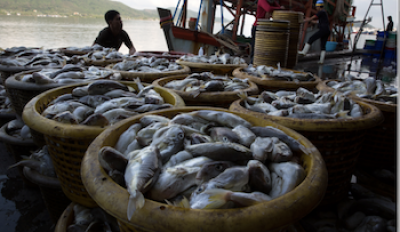
Thailand should be downgraded to the Tier 2 Watch List ranking in the U.S. Department of State’s 2021 Trafficking in Persons Report, recommends the Seafood Working Group (SWG) – a global labor rights advocacy coalition. This is necessary due to the continuation of violations of internationally recognized labor rights that make migrants particularly vulnerable to human trafficking as well as a deterioration of rights for vulnerable workers stemming from COVID-19 policies.
The Seafood Working Group presented its recommendation in a 47-page report that compiles 24 cases of labor abuse from frontline worker organizations across a range of labor sectors and geographies in Thailand.
The report documents government failures to identify and protect workers, including children, who were in situations of egregious labor abuse, forced labor and human trafficking. One, particularly concerning trend, relates to groups of Rohingya people from Myanmar being identified as “illegal aliens”, facing long periods in detention centers and then deportation, despite clear indicators of human trafficking and their expressions of fear to return to Myanmar.
In addition, the report describes how the Thai government has failed to make any progress in fulfilling its commitments to ratify ILO conventions on freedom of association and collective bargaining and continues to restrict foreign workers from organizing and forming unions. The report shows that the government and employers continued to retaliate against workers, trade unionists, and labor rights defenders who attempt to organize and improve working conditions.
“The cases of union retaliation and judicial harassment have posed serious obstacles to preventing human trafficking and protecting potential victims. The cases send a message that workers who speak out will face consequences, creating a chilling effect for reporting future abuses,” said Esmeralda López, GLJ-ILRF’s Legal and Policy Director.
The Seafood Working Group report documents several cases across the seafood processing, fishing, and large-scale agriculture industries where employers used methods such as document confiscation, physical violence, wage withholding, and forced overtime to keep migrants working under poor and dangerous conditions to meet product demand. There was also a pattern of excessive overworking in the seafood industry due to increases in demand for shelf-stable seafood during the pandemic.
Of particular concern, when COVID-19 hit the seafood processing hub Samut Sakhon in December 2020, government authorities used barbed wire to seal off an area housing more than 3,000 migrants, collectively quarantining infected and non-infected workers together, which caused food prices to skyrocket and sudden mass unemployment.
“COVID-19 further exposed the systematic discrimination facing migrant workers in Thailand. Policies and employer practices that were unchecked by the government prevented migrant workers from accessing social security benefits and in some cases medical care during the pandemic. Nearly a year since COVID-19 hit Thailand, the government has failed to address these issues. Without employment and access to social protections, these people have become increasingly vulnerable to labor abuses and human trafficking,” said Ms. López.
Led by Global Labor Justice-International Labor Rights Forum (GLJ-ILRF), the Seafood Working Group is an internationally recognized coalition of human rights, labor, and environmental organizations that work together to advocate for effective government policies and industry actions to end worker exploitation in the global seafood industry.

